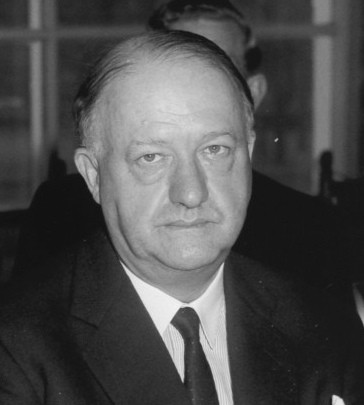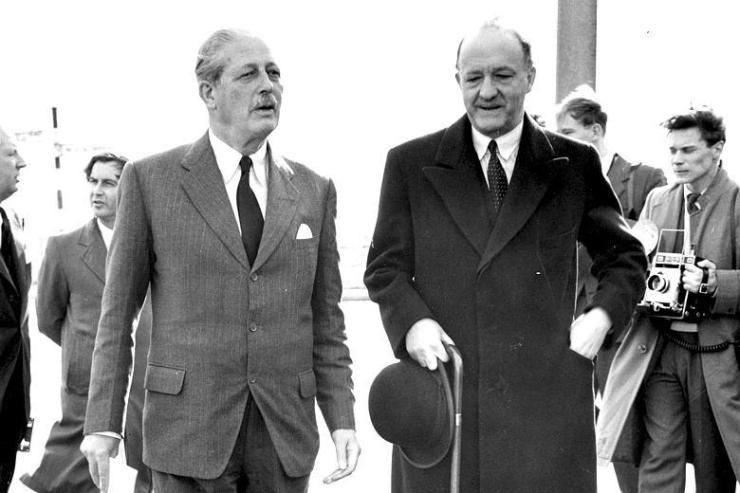 Rab Butler, 1957-62
Rab Butler, 1957-62
Conservative, under Macmillan
Butler’s reputation as the nearly man of British politics comes primarily from his failure to win the party leadership in 1957 and in 1963: in both cases, Macmillan did for him. When Eden eased him out of the Treasury, Butler allowed himself to be fobbed off with the title of lord privy seal; he was also leader of the House. Neither post was what it once had been. Furthermore, Macmillan was now at the Treasury, and had Eden’s specific assurance that Butler was not anything like his deputy. Of the two men, Macmillan was the sharper political operator, but he disguised it better.
The problem was that Butler’s quick wit and ready tongue made him appear duplicitous. He told one reporter he was ‘ready to support the prime minister in all his difficulties’. Butler always denied having said to another journalist that Eden was ‘the best prime minister we have’, but he allowed his lack of dissent from the assertion to be known. In fact, he was giving voice to what many of his colleagues felt: Eden was not up to the job.
That truth became evident with the Suez Crisis. Butler was ill when Nasser nationalised the canal, but was very much involved from thereon in. Butler tried to restrain Eden, but to little or no effect. That he favoured a more restrained approach won him the ire of the gung-ho, his failure to restrain the prime minister earned him the opprobrium of the plan’s opponents. In fact, there had been some consistency to Butler’s line. Macmillan started out all for the use of force. Then, he was all for peace. Publicly, Butler defended Eden and Suez. Privately (if a meeting of Tory MPs could be called private), he was critical. His reputation for duplicity seemed confirmed. Meanwhile, the genuinely duplicitous Macmillan kept his counsel.
When Eden fell ill and retreated to Ian Fleming’s Caribbean retreat Goldeneye, Butler took charge of cabinet just as he had when Churchill was ill. He made no attempt to campaign for the leadership, perhaps assuming Eden’s departure to be some way off, or just as likely assuming the job was his. For a man without a strong base in the cabinet and parliamentary party, that was a mistake. When Butler’s colleagues were sounded out about the leadership, only three supported him.
Having lost out to Macmillan, Butler wanted the Foreign Office, but was offered the Home Office instead. This was, once more, a piece of astute politicking by Macmillan. Butler had another of the major offices of state, and would act as Macmillan’s deputy when he was on his travels. As a reforming home secretary, however, he would not be popular with a party faithful renowned for their attachment to the rope and the birch. Butler refused to reintroduce flogging, and the Homicide Act, 1957 (primarily Gwilym Lloyd-George’s work) reined in the death penalty, though there were still cases in which the abolitionist Butler allowed the law to take its dismal course. One of them, the execution of James Hanratty, was controversial at the time and for a long time after.
There were reforms in charities’ law, licensing hours and the law on obscene publications. In addition, by the introduction of betting shops, Butler’s Betting and Gaming Act for the first time enabled the poorer classes to place a bet without breaking the law. He was not able to see off the Colonel Blimps or the lord chancellor, Lord Kilmuir, when it came to the Wolfenden Report: homosexuality remained a criminal offence.
In 1958, Britain’s first race riots broke out, most notoriously in Notting Hill, London. For the first time, television showed disturbing images of police battling both black and white youths, and petrol bombs on the streets. Butler responded with what was to become the classic government response to civil disorder. He talked tough, and the nine white ringleaders received long prison sentences. He also commissioned an inquiry. The Salmon Report saw the 1958 riots as a law and order issue. The report did not directly suggest immigration controls, but that was the lesson the government drew.
They faced a number of political problems. In the first place, there was a strongly anti-immigrant and racist element on the Conservative backbenches and in the wider party. In 1961, a group of young Tory activists founded the Monday Club, a right-wing pressure group focussed particularly on the issues of immigration and decolonisation (it would be particularly supportive of Ian Smith’s Rhodesia and apartheid South Africa). Race would play an increasing role in British politics, from the Smethwick election in 1964 through to Powell’s Rivers of Blood speech in 1968. Undoubtedly, there was social dislocation in communities like Notting Hill, or the West Midlands, that saw large-scale immigration. More widely, a substantial proportion of the electorate feared immigration; many of those were racist. Thus, Butler was the first of many Conservative home secretaries to find himself in a political bind over immigration.
The Commonwealth Immigrants Act, 1962, sought to limit black and Asian immigration, known euphemistically as new Commonwealth immigration, into Britain. It was, as such, an overtly racist measure. Labour opposed it (though they would introduce a tougher act in 1968). In truth, though, Butler adopted it with no little reluctance and under immense political pressure from his own party. There would be further immigration or nationality acts under Heath, Thatcher and Cameron. Immigration, as we all know, was very much a live issue in the 2016 referendum. In that light, Butler’s response might be seen as more measured than some.
Butler remained central to Macmillan’s government, running the cabinet’s home affairs committee. He was a casualty of the Night of the Long Knives, losing the Home Office and being, in effect, kicked upstairs as first secretary of state. Earlier, Butler had been given the new Central Africa department: he now made important moves towards the independence of the remaining colonies. Early in 1962, Macmillan had said to Butler that if he went soon, Butler would succeed him. Macmillan either changed his mind, or didn’t mean what he said. One of Macmillan’s favourite putdowns was to damn with faint praise: Butler was a fine staff officer rather than a commander. Macmillan, for the second time, played the key role in denying Butler the top job: first supporting Hailsham and then, when his star fell, supporting Home.
 Even then, Butler might have won. The selection procedure that chose Home was fundamentally flawed, and had Butler fought his ground, as his supporters were urging him, he might have won the job. Home was an old friend, true, but not the right choice for prime minister, Butler thought. Had he and his supporters made it known that they would not serve under him, Home’s chances would have been shot. For Enoch Powell, one of his strongest supporters, they had handed him the loaded gun, but Butler refused to wield it in anger. A while before, Hailsham asked Macmillan why he had decided Butler should not be prime minister: Macmillan had replied that Butler didn’t ‘have it in him’.
Even then, Butler might have won. The selection procedure that chose Home was fundamentally flawed, and had Butler fought his ground, as his supporters were urging him, he might have won the job. Home was an old friend, true, but not the right choice for prime minister, Butler thought. Had he and his supporters made it known that they would not serve under him, Home’s chances would have been shot. For Enoch Powell, one of his strongest supporters, they had handed him the loaded gun, but Butler refused to wield it in anger. A while before, Hailsham asked Macmillan why he had decided Butler should not be prime minister: Macmillan had replied that Butler didn’t ‘have it in him’.
It was a harsh judgement, but quite possibly fair. In the end, he lacked the killer instinct. Home would lose, narrowly, in 1964. Years later both Macmillan and Home came to believe it would have been better had Butler won: he might have won them the 1964 general election. The suspicion remains, however, that he didn’t want it enough. Under Home, he would be foreign secretary, though to little effect. For all that, Butler would be one of only three men since 1906 to have held all three of the great offices of state: like him, Sir John Simon was never prime minister (Jim Callaghan was). He was one of ten men to have been both home secretary and chancellor, and one of eight to hold both the Home Office and the Foreign Office. He was a successful home secretary in a department that has proved the political death star of many a Tory, or has led others to cheap shots to please the baying party faithful. In Enoch Powell’s view, Butler was a great reforming home secretary. On top of that, he was one of the key figures in the Conservatives return to power in 1951 and their ability to stay there for 13 years: as such, perhaps the nearly man, but hardly a failure.
You can read about Butler’s career up until 1955, and his time as chancellor, here; you can read about his time as foreign secretary and after, here.